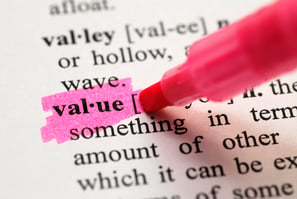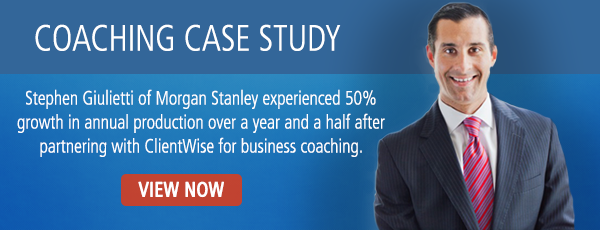Building Enterprise Value in Your Financial Advisory Firm
 If you were actually able to stay awake through your 8:00am college economics class, you might recall a definition of Enterprise Value as a firm’s market capitalization plus debt, minority interest and preferred shares, minus total cash and cash equivalents. If you did recall that calculation, congratulations! Now forget it, as it has no relevance to this discussion.
If you were actually able to stay awake through your 8:00am college economics class, you might recall a definition of Enterprise Value as a firm’s market capitalization plus debt, minority interest and preferred shares, minus total cash and cash equivalents. If you did recall that calculation, congratulations! Now forget it, as it has no relevance to this discussion.
In the world of financial advisory practices, true enterprise value has a different and far less quantifiable definition – the ability of your business to outlast its founder while continuing to sustain and grow. But how exactly does an adviser go from maintaining a practice to building a scalable, sustainable and durable business with enterprise value?
Embracing your role as CEO and team leader
Most importantly, you need to shed your sole practitioner mindset and embrace your role as advisor CEO, stepping back from day-to-day duties long enough to begin thinking long-term strategically and aligning personnel, technology and marketing decisions with clear and achievable goals.
No doubt, you’ve seen an increase in the complexity of your firm’s strategies, service model and organizational structure over the years. The question is, have the skill sets and roles of your team kept pace? Have you effectively built a highly specialized, interdependent team that is able to more efficiently manage these more complex client relationships and scalable to adapt to future growth without disruption?
In a recent blog, I touched on the important and fundamental difference between “a work group” and “a team.” The former is merely a group of people who are required to work together to process a great deal of complex work on behalf of an advisor – task-oriented in their focus rather than strategic. In the latter, however, individuals work collaboratively and interdependently, always with a strategic focus. Ultimately, the more your team works interdependently, the more durable it will be and the greater your resulting enterprise value. To that end, it’s important to maintain your focus on:
- Ensuring the whole team is focused on delivering superior service to their clients;
- Creating clean and well-defined career tracks;
- Aligning compensation to team-based goals;
- Leveraging technology to gain efficiency and scale; and
- Establishing a potential path to ownership
Building enterprise value needs to be a top-of-mind consideration from Day 1. It can’t be something you turn your attention to only when you begin considering an exit strategy and how best to monetize your equity. If you wait until then, it’s simply too late. A sustainable and durable business must be bigger than any one individual – even its founder and principal owner. For the business to endure and thrive, both your clients and your team must understand and embrace that reality.
To read more about Building Enterprise Value, check out another on of my blogs written for Investment News: 5 Steps to Building Enterprise Value
Coaching Questions from this article:
- What measures have you taken to enhance your firm’s enterprise value? What additional steps might you consider?
- If you walked away tomorrow, could your business sustain itself? What actions could you take to begin improving that likelihood?
- How might you start better preparing the future leadership of your firm to assume the reins at some point in the future?
Topics: Business Development Team Development



